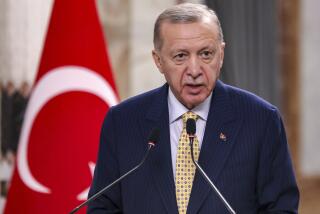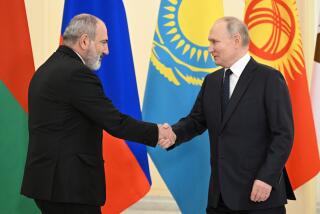Turkey builds on regional ties
- Share via
Reporting from Beirut — Turkey took over the rotating leadership of a trade organization that includes Iran, Afghanistan, Pakistan and Central Asian states on Thursday in a post that highlights the country’s increasing economic and political clout.
Iran’s newly designated caretaker foreign minister, Ali Akbar Salehi, made his first diplomatic appearance at the 11th summit of the Economic Cooperation Organization, or ECO. He joined other envoys and heads of state for a gathering meant to solidify ties between the lands of the ancient Silk Road and establish a free-trade zone among the countries by 2015.
“It should be our priority to make the old Silk Road a corridor of energy, trade, communication and transportation to promote the welfare of our respective countries,” Turkish President Abdullah Gul said, according to Turkey’s semi-official Anatolia news agency.
Turkey, Iran and Pakistan founded the ECO a quarter century ago. The trade bloc took on added importance with the addition of newly independent Central Asian states such as energy-rich Azerbaijan as well as Afghanistan in the early 1990s.
Under an ambitious leadership rooted in the country’s Islamist movements, Turkey has since become a regional powerhouse, with an economy ranking in the top 20 worldwide and a growth rate that rivals that of China. It presents itself as a gateway to Central Asia, though initial attempts to draw Kazakhstan, Turkmenistan, Kyrgyzstan, Uzbekistan and Tajikistan into its sphere of influence under a pan-Turk banner foundered.
“They’ve turned Istanbul into a major hub,” said Henri Barkey, a Turkey specialist at Lehigh University in Pennsylvania.
Turkey has also sought to present itself as a diplomatic broker, seeking to ease tensions between Iran and the West and between Syria and Israel. It is scheduled to host international talks next month on Iran’s nuclear program.
The United States in particular has grown nervous both about what foreign policy analysts have described as Turkey’s lurch eastward and its more ambitious diplomatic endeavors, especially since the rise in the last decade of Prime Minister Recep Tayyip Erdogan and his Justice and Development Party, known by its Turkish initials, AKP.
“Turkey has evolved from an ordinary wing country of the Cold War era toward a central country determining its position on its own,” said Taha Ozhan, an Istanbul-based analyst at the Foundation for Political and Economic Research, a Turkish think tank close to the government. “Instead of trying to understand Turkey’s recent foreign policy initiatives with concepts like ‘axis shift’ or ‘change of direction,’ one needs to consider them as part of a larger effort to adapt to the transformation process in today’s world order.”
To many regional countries, Turkey plays an enviable balancing act, maintaining warm and commercially beneficial ties with Syria and Iran on one hand while remaining a member of the North Atlantic Treaty Organization, supplying troops to the security force in Afghanistan and seeking to improve a frayed relationship with Israel on the other.
“The diplomats of Turkey are playing the role of old wise tribal leaders in settling the disputes in the region,” said Davoud Hermidas-Bavand, a Tehran-based former Iranian diplomat and professor of international relations. “The star of Turkey in term of politics, economy and culture is shining much more brightly than before.”
But Barkey cautioned not to exaggerate the summit’s significance to Ankara because the organization lumps more economically developed Turkey with authoritarian backwaters such as Azerbaijan and Turkmenistan and war-ravaged Afghanistan and Pakistan. “In the land of the blind, the one-eyed man is king,” he said.
Special correspondent Ramin Mostaghim in Tehran contributed to this report.
More to Read
Sign up for Essential California
The most important California stories and recommendations in your inbox every morning.
You may occasionally receive promotional content from the Los Angeles Times.













